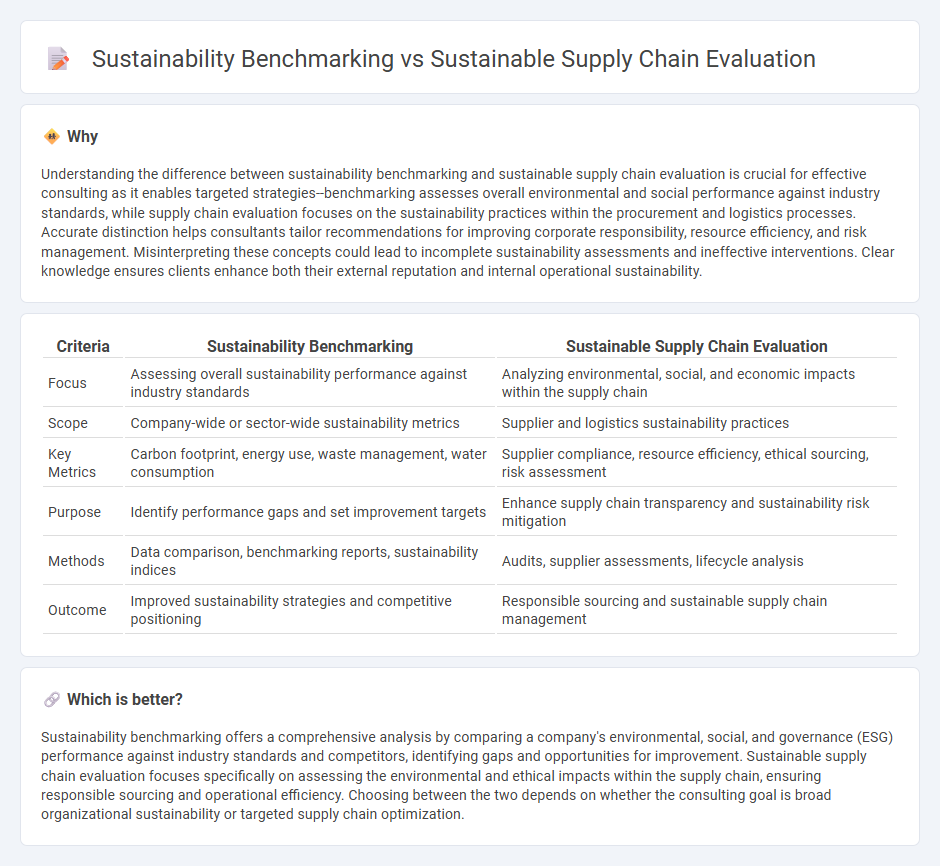
Sustainability benchmarking measures a company's environmental, social, and governance (ESG) performance against industry standards and peers to identify strengths and areas for improvement. Sustainable supply chain evaluation assesses the entire procurement process, focusing on ethical sourcing, carbon footprint reduction, and resource efficiency to ensure responsible supply chain management. Discover more about how these approaches drive corporate sustainability success.
Why it is important
Understanding the difference between sustainability benchmarking and sustainable supply chain evaluation is crucial for effective consulting as it enables targeted strategies--benchmarking assesses overall environmental and social performance against industry standards, while supply chain evaluation focuses on the sustainability practices within the procurement and logistics processes. Accurate distinction helps consultants tailor recommendations for improving corporate responsibility, resource efficiency, and risk management. Misinterpreting these concepts could lead to incomplete sustainability assessments and ineffective interventions. Clear knowledge ensures clients enhance both their external reputation and internal operational sustainability.
Comparison Table
| Criteria | Sustainability Benchmarking | Sustainable Supply Chain Evaluation |
|---|---|---|
| Focus | Assessing overall sustainability performance against industry standards | Analyzing environmental, social, and economic impacts within the supply chain |
| Scope | Company-wide or sector-wide sustainability metrics | Supplier and logistics sustainability practices |
| Key Metrics | Carbon footprint, energy use, waste management, water consumption | Supplier compliance, resource efficiency, ethical sourcing, risk assessment |
| Purpose | Identify performance gaps and set improvement targets | Enhance supply chain transparency and sustainability risk mitigation |
| Methods | Data comparison, benchmarking reports, sustainability indices | Audits, supplier assessments, lifecycle analysis |
| Outcome | Improved sustainability strategies and competitive positioning | Responsible sourcing and sustainable supply chain management |
Which is better?
Sustainability benchmarking offers a comprehensive analysis by comparing a company's environmental, social, and governance (ESG) performance against industry standards and competitors, identifying gaps and opportunities for improvement. Sustainable supply chain evaluation focuses specifically on assessing the environmental and ethical impacts within the supply chain, ensuring responsible sourcing and operational efficiency. Choosing between the two depends on whether the consulting goal is broad organizational sustainability or targeted supply chain optimization.
Connection
Sustainability benchmarking establishes performance standards that guide sustainable supply chain evaluation, ensuring suppliers meet environmental and social responsibility criteria. By comparing sustainability metrics across industry peers, organizations identify gaps and improvement opportunities within their supply chain processes. This connection drives informed decision-making to optimize resource use, reduce carbon footprint, and enhance ethical sourcing practices.
Key Terms
Lifecycle Assessment (LCA)
Sustainable supply chain evaluation emphasizes assessing environmental and social impacts across suppliers, with Lifecycle Assessment (LCA) providing detailed insights into resource use and emissions at each stage. Sustainability benchmarking compares organizational performance against industry standards or competitors using LCA metrics to identify improvement opportunities. Explore how integrating LCA in supply chain evaluation and benchmarking drives informed sustainability decisions.
Key Performance Indicators (KPIs)
Sustainable supply chain evaluation involves assessing environmental, social, and economic impacts across the entire supply chain using specific Key Performance Indicators (KPIs) such as carbon footprint, waste reduction, and supplier compliance rates. Sustainability benchmarking compares these KPIs against industry standards or competitors to identify performance gaps and best practices for continuous improvement. Explore detailed methodologies and KPI frameworks to enhance your organization's sustainability strategy.
Benchmarking Standards
Sustainability benchmarking involves measuring supply chain performance against established environmental, social, and governance (ESG) standards such as the Global Reporting Initiative (GRI) or the Dow Jones Sustainability Index (DJSI), ensuring consistent comparison across industries. Sustainable supply chain evaluation assesses specific processes and practices within a supply chain to identify sustainability risks and opportunities in real-time operational contexts. To understand the critical role of benchmarking standards in driving measurable sustainability improvements, explore detailed frameworks and methodologies used worldwide.
Source and External Links
Screening of sustainable supply chain performance evaluation - This study establishes a comprehensive evaluation indicator system for sustainable supply chains based on economic, environmental, and social dimensions, using data from 100 Chinese companies to create 16 robust performance indicators that minimize redundancy and improve discrimination of sustainability performance results.
Evaluation of sustainable supply chain management performance: Indicators - This paper identifies and synthesizes key sustainability indicators across economic, environmental, and social dimensions specifically for supply chain assessment, employing Delphi technique to select the most critical metrics useful for practical and comprehensive sustainable supply chain performance measurement.
Supply Chain Sustainability Assessments - EcoVadis - EcoVadis provides a widely recognized, online sustainability rating system assessing suppliers on environment, labor & human rights, ethics, and sustainable procurement, enabling companies to evaluate and improve the sustainability performance of their supply chains through a detailed scorecard.
 dowidth.com
dowidth.com